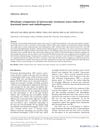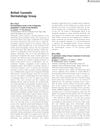 February 2009 in “Journal of The American Academy of Dermatology”
February 2009 in “Journal of The American Academy of Dermatology” Fractional infrared technology is effective and safe for treating cervical laxity.
 4 citations,
August 2022 in “Lasers in medical science”
4 citations,
August 2022 in “Lasers in medical science” Both 1565-nm laser and 1064-nm laser safely and effectively reduce enlarged facial pores, with the 1064-nm laser causing fewer side effects.
September 1998 in “Journal of the European Academy of Dermatology and Venereology” 143 citations,
January 2013 in “Dermatologic surgery” In-office laser hair removal works well long-term, especially Nd:YAG for darker skin, but home devices need more testing.
7 citations,
April 2006 in “Lasers in medical science” Acneform reactions after laser hair removal occur in 6% of cases, mostly mild and short-lived, with higher risk in younger patients, those treated with Nd:YAG laser, and individuals with darker skin.
1 citations,
November 2010 in “Obstetrics and gynecology clinics of North America” Gynecologists can make more money by offering laser hair removal because it's popular.
82 citations,
May 2005 in “Dermatologic therapy” Laser hair removal has advanced to effectively reduce hair for various skin types and hair colors.
 73 citations,
April 1999 in “Dermatologic Clinics”
73 citations,
April 1999 in “Dermatologic Clinics” Lasers and light sources can effectively remove hair, work best on fair skin with dark hair, and usually need multiple treatments.
46 citations,
December 2000 in “Seminars in Cutaneous Medicine and Surgery” Laser and light treatments offer quick, long-lasting hair removal for large areas.
 27 citations,
August 2014 in “Journal of Cosmetic and Laser Therapy”
27 citations,
August 2014 in “Journal of Cosmetic and Laser Therapy” Different lasers and radiofrequency affect skin differently, important for dermatologists to choose the right treatment.
27 citations,
July 2013 in “The journal of investigative dermatology/Journal of investigative dermatology” Lasers have become precise tools in skin treatment and diagnosis, with ongoing advancements improving their effectiveness.
 25 citations,
August 2017 in “Lasers in Medical Science”
25 citations,
August 2017 in “Lasers in Medical Science” Fractional lasers seem effective and safe for treating hair loss, but more research is needed to find the best treatment methods.
 19 citations,
August 2007 in “Seminars in Plastic Surgery”
19 citations,
August 2007 in “Seminars in Plastic Surgery” Newer skin resurfacing lasers reduce damage and scarring, with some approved for safe use and minimal side effects.
 17 citations,
January 2021 in “Dermatology and Therapy”
17 citations,
January 2021 in “Dermatology and Therapy” Laser-assisted drug delivery has shown improved treatment outcomes for skin conditions and has potential to reduce side effects and treatment time.
17 citations,
October 2017 in “Journal of cosmetic and laser therapy” Laser hair removal is effective and safe for reducing facial hair in women with PCOS and improves their psychological well-being.
 16 citations,
November 2016 in “Journal of Cosmetic and Laser Therapy”
16 citations,
November 2016 in “Journal of Cosmetic and Laser Therapy” Laser and light therapies, especially the 308 nm excimer laser, are effective and safe for treating alopecia areata, but more research is needed.
11 citations,
March 2012 in “Journal of the American Academy of Dermatology” Most patients with dark skin were satisfied with laser hair removal and had few complications.
 10 citations,
January 2000 in “Journal Of Cutaneous Laser Therapy”
10 citations,
January 2000 in “Journal Of Cutaneous Laser Therapy” Laser hair removal might also work by damaging blood vessels around hair follicles.
8 citations,
May 2004 in “Facial plastic surgery clinics of North America” Laser hair removal is now more effective, but the best treatment schedule is still uncertain.
Laser hair removal works well for light skin with dark hair but needs caution for darker skin.
1 citations,
March 2011 in “WORLD SCIENTIFIC eBooks” Laser hair removal can be effective and safe for Asian skin with proper techniques and care.
 January 2025 in “Journal of Cutaneous and Aesthetic Surgery”
January 2025 in “Journal of Cutaneous and Aesthetic Surgery” Low-level laser therapy effectively improves hair growth in androgenetic alopecia with minimal side effects.
 September 2024 in “Pakistan Journal of Science”
September 2024 in “Pakistan Journal of Science” Laser treatments, especially low-level laser therapy, can improve hair growth, but more research is needed.
 April 2024 in “Lasers in medical science”
April 2024 in “Lasers in medical science” Lasers and light therapies are effective in promoting hair regrowth for different types of hair loss.
 July 2021 in “British Journal of Dermatology”
July 2021 in “British Journal of Dermatology” Laser treatment for skin conditions VEN and ILVEN is effective and liked by patients.
 January 2018 in “Springer eBooks”
January 2018 in “Springer eBooks” Lasers are FDA-approved for permanent hair reduction, not removal, and more research is needed to improve treatments.
 April 2017 in “Journal of Investigative Dermatology”
April 2017 in “Journal of Investigative Dermatology” Laser treatment may help with hair growth in some people with frontal fibrosing alopecia, but results vary and the exact way it works is unclear.
40 citations,
September 2012 in “European Journal of Dermatology” Laser hair removal significantly improves acne keloidalis nuchae, especially with early treatment.
 31 citations,
September 2014 in “Journal of Pharmaceutical Sciences”
31 citations,
September 2014 in “Journal of Pharmaceutical Sciences” Using a special laser can improve how well hair loss treatments get into the skin and hair follicles.
 11 citations,
January 2015 in “Annals of Dermatology”
11 citations,
January 2015 in “Annals of Dermatology” Using a hair removal laser can make hairs finer for better hairline correction in hair transplants, with most patients happy and few side effects.

















